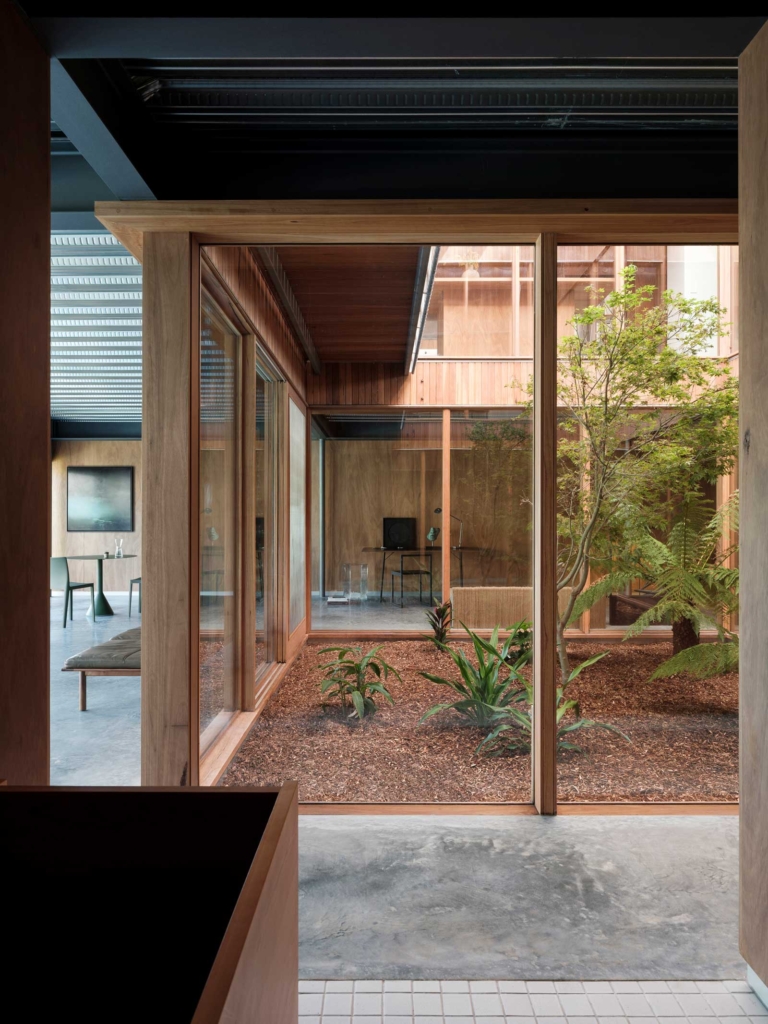
The Unbeatable Ups – Madeleine Blanchfield for Women's History Month
If strength and leadership are frequently associated with force and brutality, then architect Madeleine Blanchfield is a convincing antithesis to this idea. Level-headed and self-assured, her serene presence belies the level of audaciousness typically associated with accomplishment, proving that success has many faces. In line with Women’s History Month, The Local Project spoke with Madeleine about the beauty of architecture as a vocation and the importance of women putting themselves first.
“To me, Women’s History Month and celebrating women who tell our stories is recognising women who put a lens on our society or show us who we are,” Madeleine shares from her home in Bronte, which she designed for her family in 2019. She continues, saying, “that could be through art or different types of media, and I think it’s so important because if we don’t have access to look at ourselves, we can’t pass on information and stories, and we can’t improve as a society and understand each other better.” Visibility and knowledge sharing emerge frequently in the pursuit for equality, and these two tenets appear to ground Madeleine’s approach as a woman practitioner in a field dominated by men.
Madeleine admits that as a profession, architecture can be gruelling, referring to often-lengthy project timelines, diverse client expectations and relationship management within, specially, the realm of high-end, private residential design. “What we do is so bespoke,” she says. “Every day we’re doing something completely new that’s never been done before and so there isn’t really a rule book.” However, the mother-of-two frequently looks to her colleagues and peers for strength and support. “The architecture industry has a fantastic group of women – we get together sometimes and share experiences,” she offers, adding, “you can learn a lot that way because most of the time someone’s been through something similar and that sharing of knowledge […] is so important.”
Madeleine’s pursuit of a career as an architect has been steadfast, for which she credits her mother. “If I had to name one woman who’s influenced me in the way I work, it’s my mum,” she says. “She taught me that anything is possible, you can do whatever you set your mind to, and it doesn’t matter who you are or where you’re from – if you want to do it, you can do it.” This attitude can be traced back to the foundations of Madeleine’s career; upon leaving school, she turned down a scholarship to the Australian National University for a place in the University of Canberra’s architecture program. “At that time, there were kangaroos in the carpark and about 30 people in the year and as soon as I got there, I knew I’d found my people and my place,” she fondly reflects.
The following years involved a stint at PTW working across large-scale commercial projects; travel and work in London and Paris; and 10 years with BKH in Sydney, all of which culminated in her founding her own practice in 2009 – a feat she recalls as her proudest professional achievement. “When I started my own business, it was just me and a baby in my bedroom,” she shares. “I was never very strategic about wanting to build a business, I just wanted to do architecture because I loved it. Over the years it’s grown into this incredible team of people – I look around and I’m constantly blown away by the energy and how dedicated and talented everyone is.”
After over two decades in the architecture industry, Madeleine is pleasingly buoyed by her personal experiences as a practicing woman architect. Many of her mentors have been men and she sees their respective roles in her progression as valuable and positive. Yet, she admits that this industry – like many others – is ripe for change and, encouragingly, she believes such progress is stirring. As she says, “I think we’re getting closer to a time where [gender] doesn’t matter anymore. You are who you are, your skills are your skills and, really, we could all have paper bags on our heads.”
While her experience has been largely constructive, it has not been without its challenges. Founding her own business and simultaneously starting a family made for a particularly intense period on personal and professional fronts. “My kids are getting a bit older now so it’s getting easier but there was a time where it was just survival mode.” Madeleine acknowledges that there is an element of momentum and endurance required to see such challenging periods through, however, her ability to recognise times of trial and check-in with herself accordingly has proved crucial. “Burnout is a huge problem in our industry, so we need to be really aware of not coping and asking for help before it’s too late,” she says. “Looking after yourself mentally and physically is so important because you can’t do anything if you’re not in your best shape. You need to catch yourself everyday […] to get in touch with where you’re at.”
Madeleine’s palpable love of her work, reassuring optimism and diligence create a foundation from which she navigates challenges with composure and celebrates the wins. When needed, she finds relief in running and meditating, yet her greatest virtue seems to be acknowledging the sometimes-competing realities of working life. “You’re not going to love any job all day, every day – there’s always mundane and frustrating stuff but I think the beauty of architecture is that you’re always getting those little ups. Standing in a house you’ve done for someone and them saying ‘you’ve changed our lives’ – that’s just unbeatable.”

























